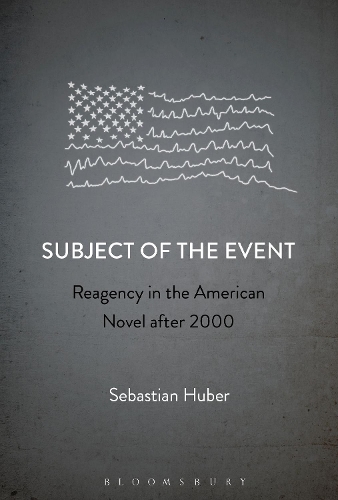
Subject of the Event: Reagency in the American Novel after 2000
(Hardback)
Available Formats
Publishing Details
Subject of the Event: Reagency in the American Novel after 2000
By (Author) Dr. Sebastian Huber
Bloomsbury Publishing PLC
Bloomsbury Academic USA
5th May 2016
United States
Classifications
Tertiary Education
Non Fiction
Literary studies: fiction, novelists and prose writers
813.609
Physical Properties
Hardback
328
Width 152mm, Height 229mm
608g
Description
What does falling in love have in common with the fall of the Berlin Wall Or the fall of the Twin Towers In the light of postmodernisms programmatic critique of a humanist notion of the subject and an emphatic understanding of events, Subject of the Event shows that selected American novels after 2000 offer an alternative to the death of the subject. As the first book to comprehensively engage with Alain Badious writings outside of a philosophical context, Subject of the Event analyzes five critically acclaimed novels of the new millenniumCormac McCarthys The Road (2006), Jess Walters The Zero (2006), Mark Z. Danielewskis Only Revolutions (2006), Paul Beattys Slumberland (2008) and Thomas Pynchons Against the Day (2006)and argues that they create different subjects of the event that are empowered with reagency. The subject of the event and its empowerment, what this book calls reagency, implies that subjects only evolve out of their confrontation with the revolutionary impetus that events propel. Unlike a humanist capability of having agency, reagency is defined as a repetitive subjective praxis that is contingent upon events, which is given a concrete literary form in the novels under investigation. Sebastian Huber explores how the American penchant for events (new beginnings, clean slates, apocalypse) is being critically dealt with in the novels at hand, while still offering an emphatic idea of singular disruptions that open up ways for subjects to affirm and become empowered by the new propositions of these happenings.
Reviews
Drawing on Alain Badious notion of the subject of the event, Huber leads the way out of a conceptual deadlock that has informed much of contemporary literary studies. Having less agency than the premodern subject-supposed-to-be-autonomous, but more agency than the postmodern subject supposed-to-be-a-victim-of-discursive-circumstance, the subject of the event allows to think a precarious, invariably site- and time-specific subjectivity that is not either active or passive, but active and passive simultaneously. In a number of brilliantly provocative readings of contemporary American fiction, Huber asks what it means for this new subject or should I simply say us to be faithful or also unfaithful to the event. What ultimately drives the books argument is Badious equally pressing and acute question of how are we to be faithful to changing the world within the world itself On this background, Hubers book promises to become itself somewhat of an event. * Hanjo Berressem, Professor of American Studies, University of Cologne, Germany *
Philosophically rich and packed with ingenious readings, Sebastian Huber's Subject of the Event: Reagency in the American Novel after 2000 is a fresh and exciting intervention in philosophical literary criticism. Indeed, while we may have been told that 'the era of Theory is over,' rumours of its death remain greatly exaggerated. Focusing on Badiou's notion of the 'event' and its complicated interactions with contemporary American fiction, Huber's book demonstrates that there is still gold to be mined at the intersection of philosophy and literature. * Martin Paul Eve, Senior Lecturer in Literature, Technology and Publishing at Birkbeck, University of London, UK *
Using Alain Badious philosophy, Huber defines events as nonontological, contingent, and singular ruptures. By analyzing Cormac McCarthys The Road (2006), JessWalters The Zero (2006), Mark Z. Danielewskis Only Revolutions (2006), Paul Beattys Slumberland (2008), and Thomas Pynchons Against the Day (2006), he argues that events and subjects are two phenomena that are inherently reciprocal. America as a concept is fundamentally associated with emphatic events, according to Huber. His goal is to employ a theoretical approach that opposes poststructuralism and postmodernism, while also avoiding the traditional humanist conception of the subject. * American Literature *
Author Bio
Sebastian Huber is Lecturer for English at the Fresenius University, Munich, Germany.
